what we offer
Our courses
Found a course you like? Click on the course for more information and to register.

This course is designed for marketing enthusiasts, business professionals, and aspiring luxury brand managers who seek to master the intricacies of the elite market segment. Through a blend of theoretical insights and practical case studies, you will gain a deep understanding of the unique challenges and opportunities within the luxury sector.

Developing effective risk management and crisis management strategies is of vital importance to organisations in today’s business environment. This course helps you navigate modern challenges with an overview of key concepts and issues in the field of risk and crisis management. Case studies are used to outline key frameworks and strategies in order to demonstrate how organisations of all sizes can respond to challenges and obstacles in an era of uncertainty.

Once only a feat of governments, today, SpaceX and Virgin Galactic, among others, systematically conduct space-related activities. The discussion continues with companies establishing themselves on craters and lunar real estate being in dispute. After completion of this course, you will be able to respond to questions such as: “What are the ethical dimensions of space settlement?” and “What are the economic elements of going to space, and who might benefit from them?”

This course aims to make you a financial analyst. You will learn how to analyse financial statements of two or more corporations (such as Microsoft and Apple) to compare and contrast the performance, liquidity, and solvency from the points of view of a manager, banker or shareholder.

This course introduces you to the approach, concepts and methodology of game theory using simple puzzles compiled over nearly two decades of teaching game theory, along with articles from reputable newspapers addressing contemporary societal problems. Through working on such puzzles, you will gain practice with examples, enabling you to analyse real-world problems described in articles with game-theoretic tools.

This course was designed for students who are interested in the aid/development sector as well as students who are interested in logical models that can be applied to project design. During the course, you will develop your project design, monitoring and evaluation skills as well as your analytical and presentation skills.

Unlock the secrets to successful investment management with this comprehensive course, now enriched with cutting-edge AI integration through ChatGPT. Whether you’re a seasoned professional or retail investor, this course delves into the latest investment strategies, performance evaluation techniques, and the transformative power of artificial intelligence.

Becoming an effective communicator is the foundation of successful business relationships. This course will help to develop confidence and clarity in order to articulate, persuade, and build rapport with colleagues or clients. Through foundational techniques such as posture, vocal variety, and rhetorical devices, this course can help impact your career trajectory.

This course introduces you to the approach, concepts and methodology of game theory using simple puzzles compiled over nearly two decades of teaching game theory, along with articles from reputable newspapers addressing contemporary societal problems. Through working on such puzzles, you will gain practice with examples, enabling you to analyse real-world problems described in articles with game-theoretic tools.

This course was designed for students who are interested in the aid/development sector as well as students who are interested in logical models that can be applied to project design. During the course, you will develop your project design, monitoring and evaluation skills as well as your analytical and presentation skills.

The ability to effectively harness data and communicate its insights is a game-changing skill every professional and student must have. This course provides the theoretical background as well as a deep dive into the fusion of data visualisation and storytelling, two competencies that not only facilitate information dissemination but also set you on the path to becoming a clearer communicator and an invaluable asset to any organisation.

This course extends from a micro to a macro perspective to explore the relationship between marketing and society and the impact of markets and marketing practices in our current world. It encompasses elements of business and consumer rights, sustainability, social marketing, critical marketing and consumer society.
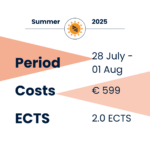
Social innovation is an intentional, positive and creative shift in systemic social-ecological patterns. Business and organisations are increasingly being called upon to experiment and act for social benefit in this manner. This course will introduce you to social innovation and entrepreneurship theory in order to critique organisations and craft innovative strategies across fields.
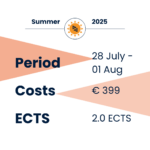
Social issues such as the gender pay gap and slow change rate can be drawn back to the male dominance in the field of economics. This course aims to re-center these social problems to their economic roots through an introduction to basic economic theories in relation to gender. By the end of the course, you will understand how to incorporate economic concepts into discussions of gender inequality to support their arguments towards a fairer world.
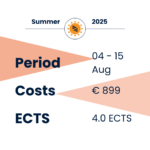
This course aims to, among others, identify new developments in the field of HRM, provide conceptual and practical frameworks for successfully managing people and teams in a global, cross-cultural context, and to develop the necessary insights and skills for international managers and professionals to operate successfully in a highly competitive, international context.
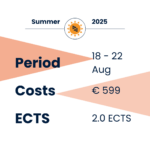
Data analytics software such as the open-source programming environment R are becoming more popular. During this course, you will be introduced to three crucial aspects of data analytics in R through lectures and interactive, assignment-based tutorials: (i) basic objects and operations in R; (ii) control flow and programming in R; and (iii) working with data in R (management, analysis, and visualisation).

Data analytics software such as the open-source programming environment R are becoming more popular. During this course, you will be introduced to three crucial aspects of data analytics in R through lectures and interactive, assignment-based tutorials: (i) basic objects and operations in R; (ii) control flow and programming in R; and (iii) working with data in R (management, analysis, and visualisation).
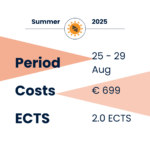
This course provides an overview of the crescent field of consumer neuroscience and explores the applications of neurosciences in different fields, such as neuroeconomics and neuromarketing. At the end of the course, you will be able to properly understand the potential and limitations of these applications, and develop innovative ways of using neuroscientific techniques in different contexts.
